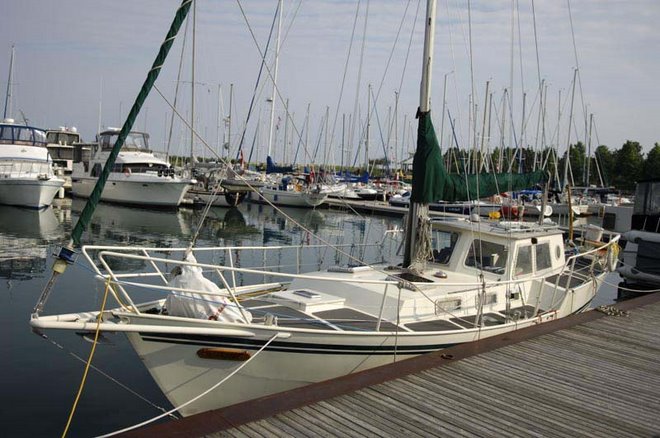 |
| The deluxe version? |
One could easily neglect to check certain dials, digital displays or indicator lights on the modern boat, and thus fail to note (or have the watchkeeper fail to note) engine overheating, low oil pressure, water ingress or some other potentially fatal condition, like a propane leak or CO build-up, requiring immediate skipperly attention.
 |
| A personal favourite |
Having had low oil pressure and cooling water overheating issues on our boats in the past, I am a fan of early warnings. There's a gas/propane sniffer on Valiente, along with a CO detector. I typically check for "output" of cooling water at the stern and eyeball the temperature and oil pressure dials of the very basic Atomic 4 control panel, and so haven't bothered with buzzers. On Alchemy, I will install more alarm setups because more of the critical systems could self-destruct without immediately noticing the process, and also because, frankly, there is a lot more at stake than aboard a Lake Ontario day sailer.
 |
| And Canadian-made, by gum |
Plenty of alarm widgets or alarm systems exist for the cautious/paranoid/typical cruiser, and some are very clever indeed, and cross over into the solenoid or automatic actuator realms.
But I wonder: why don't boat system alarms talk? Cars talk, GPSes talk, even cheap alarm clocks murmur instead of buzz. Even smoke detectors can shout at one. Even personalized smoke detectors exist.
 |
| "Get out of the house, ya little pyro!" |
Voice recognition, as fans of "Siri" know, is a thing of the present. So why should a host of boat alarms buzz with essentially the same range of tones?
It should not be massively difficult to replace that growing host of various buzzers with the sort of circuitry that is found in “talking/singing birthday cards”, or “talking seatbelt alarms” in cars and the like. Or to rig just the chips capable of holding a two or three word message, along with a small amplifier, to make a personalized alarm.
Imagine hearing instead of some random buzzer in D sharp, you heard your own voice saying “Fuel pump overpressure!” or “Bilge past six inches!” or the very useful “Exhaust temperature past 100C!”
If one did not wish to actually record specific messages, one could simply throw in random…but distinct…noises on pre-recorded chips, like "birdsong means bilges", or "fly buzzing means fuel", and so on.
 |
| Functional, but a little HAL 9000 |
It’s the distinctiveness of the alarm noise that is desirable. Buzzers tend to sound alike, because they all come from the same factory in China, I would imagine. Voices...now, the human mind zeroes in on those in terms of direction and content far more easily. Of course, if you find the idea of a verbal alarm a little creepy, there are some less buzzy options.
Picture combining the “talking alarm” with “The Clapper” for a shut-off, and you’ve got the basis for a marine products empire where the average customer’s age is already well past “I should’ve worn earplugs during that Alice Cooper tour in '72”.
Personally, I am not quite that age, myself, and due to plenty of deafness in my family, I have both nursed my hearing and had it regularly tested; it appears I'm in good nick. Spend time at an average boat club, however, and it's clear a large percentage of Boomers have listened to a few too many booms to hear their pants ringing in anything but a dead-quiet environment...which the sea is rarely.
Like my idea for dim, five-second red LEDs that would be triggered by movement across the sill of companionways at night, or a 9V battery-powered, reed switch-activated, under-lid LED locker light, I do not see a strong objection in cost or complexity of a “talking alarm” to easily distinguish what part of the boat’s systems is complaining.
It only sounds like Star Trek. The actual electronics involved would not be beyond the average electronics hobbyist, which most cruisers already are, because they can't afford not to be. I built kit shortwave radios and repaired my guitar amps as a teen and still do various electrical bench work (I'm trying to reboot an old Furuno radar I found, for instance); I don't think any of this at the level of "home-brewed" is very difficult to rig. If someone's already invented these sort of gadgets, I would enjoy hearing about it. Just not in the form of a buzzer.
 |
| "I'm sorry, Skipper, I can't unlock the rum cabinet." |





No comments:
Post a Comment